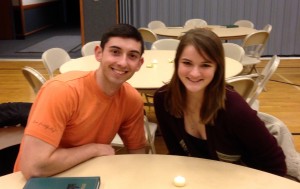
Sometimes it is difficult to walk down the sidewalks of Brigham Young University without getting boxed in by couples holding hands.
In a culture where it seems like everyone is dating, BYU students occasionally suffer from lowered self-esteem when they are not in a relationship.
Tom Golightly, the associate clinical director of BYU’s Counseling and Psychological Services office, said it is a common theme for students to seek validation from others to boost their self-esteem.
“We want to be heard, and we want to be loved,” Golightly said. “Dating relationships fill those needs in a different way than platonic relationships.”
Golightly said it can become hazardous to a student’s self-esteem when they are obsessed with their relationship status.
“Sometimes dating is the thing we overly identify with, and we lose focus on other important areas of our lives,” Golightly said.
This tendency to identify with one’s relationship status may be traced back to students’ perception that most people at BYU are dating.
“I’d say (most people) feel like there’s a need to be in a relationship,” said Ben Jensen, a junior studying statistics.
Jensen said this need comes from seeing so many people dating.
“Students see other people in relationships and feel like if they were dating someone it would make them happy because they would be in line with the status quo,” Jensen said.
Perceptions of BYU’s dating status quo may be skewed, however.
According to a 2002 research survey by Bruce A. Chadwick, only 35 percent of BYU men and 27 percent of BYU women go on a date every week.
While the numbers show there is less dating than the campus community may perceive, dating by nature has an effect on students’ self-esteem.

“By definition, dating is a process of selection, and the opposite end of that is rejection,” said Dean Busby, the director of the School of Family Life. “If you’re selected by the people you want to be selected by to go on dates and have relationships with, it boosts your self-esteem. And if you aren’t, it can make you feel deficient or unloved.”
Dating usually involves heartbreak and rejection at some point, and Busby said these experiences are a necessary part of the filtering process to find one’s eternal companion.
“Some people get rejected, and they make incorrect assumptions that they’re broken, they’re ugly, they’re never going to get married (and or) people at BYU are stuck up,” Busby said. “But you have to realize dating is supposed to be a challenging process with failures and difficulties because you’re getting to the one person you’re eventually going to marry.”
Students who may not be going on as many dates as they would like should not despair or let their self-esteem drop; rather, they should work on what they can control, Busby said. Students can do a self-evaluation and see if there are areas of their personality, appearance or emotional health they want to work on.
“The other thing to remember is timing is probably 70 percent of what determines if you’re going to marry someone,” Busby said. “It may just be that it’s not time, and you haven’t found that person yet.”
Another way students can work on their self-esteem is by increasing spirituality.
“There are many ways to be happy, especially through the gospel and reading scriptures,” said Melinda Harper, a junior studying music education.
Harper said she recognizes many students feel a sense of pressure to date, but she advised students to base their self-esteem outside of their relationship status.
“I think you should be able to find your own happiness in something other than a guy,” Harper said
She went on to say students would benefit from going on more dates just for fun instead of worrying if their date will be their eternal companion or not.
LaNae Valentine, the director of Women’s Resources at BYU, also said students would benefit from shifting their search for an eternal companion to first looking for friendship.
“Take it slow and get to know people on other levels; learn to trust, learn to rely on others, learn to be vulnerable and learn to communicate and share your feelings,” Valentine said.
Valentine said this approach keeps relationships honest and based more off true connection rather than physical compatibility.
“Making out is easy and takes no skill, but articulating your opinions, values and beliefs takes work, and that’s what we should be doing during dating,” Valentine said.
Single students do not need to feel out of place on BYU’s sidewalks. Self-esteem can be built without a boyfriend or a girlfriend; one just has to continue to work on what he or she can control and accept the rest. Dating is challenging, and it does not define a person or their worth.




